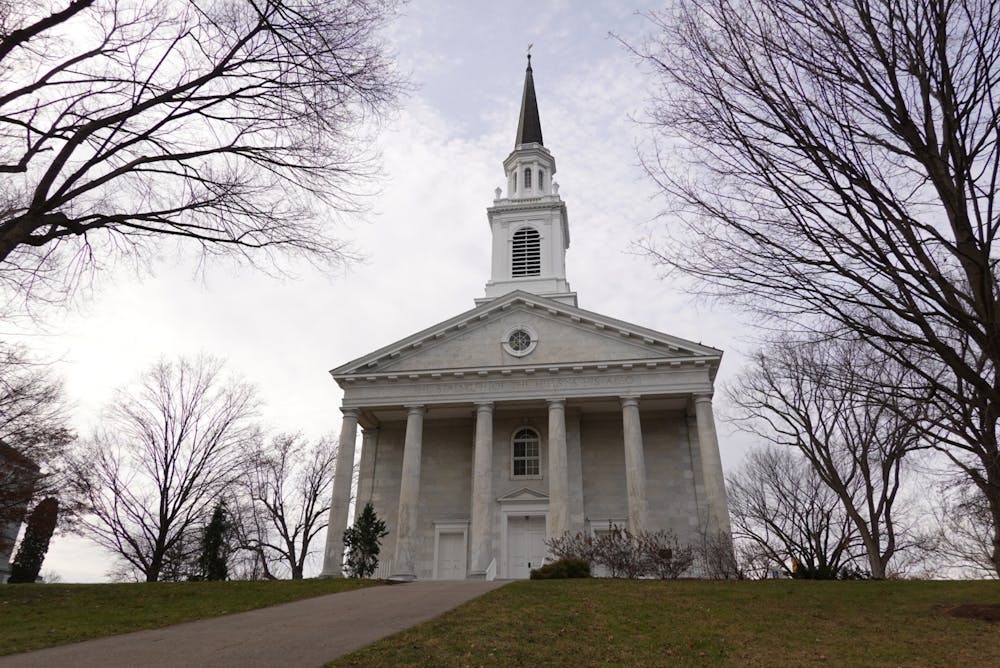As “Chapel” hangs on the sign opposite Proctor dining hall, text off-kilter and clearly unfinished, the lawsuit surrounding Middlebury’s “highest point” continues to unfold in the Addison County Superior Court.
The plaintiff’s original complaint was that Middlebury did not have the right to remove the “Mead” name from the chapel, which was built after former Governor John A. Mead donated $75,000 in total to build it on behalf of his ancestors.
In March of this year, former Vermont Governor and Executive-in-Residence James Douglas filed a lawsuit against Middlebury College for removing the “Mead” name from the chapel, due to Mead’s support of eugenic theory. Middlebury College filed a motion to dismiss on April 28, 2023, which was denied by the Addison County Superior Court on Aug. 4.
Middlebury’s counsel Justin B. Barnard of law firm Dinse, Knapp & McAndrew argue that no such naming right existed, while Douglas argues instead that the circumstances of the financial contribution imply a perpetual naming right.
“Whether framed under contract or gift law, proof that a perpetual naming right was intended ultimately will have to satisfy an elevated standard of clarity to be enforceable, ” Judge Robert A. Mello wrote in his opinion.
Writing the decision from the Addison Unit of the Vermont Superior Court Mello, reiterated that the central question of the lawsuit is whether John Mead’s contribution in 1914 falls under contract or gift law, and if there was a perpetual naming right included at the time.
Jared Carter, professor of law at Vermont Law School, shared his perspective on the way Douglas’ lawsuit has unfolded thus far. Carter emphasized that motions to dismiss are common in early stages of litigation in order to test the sufficiency of the plaintiff’s claims.
“This was a decision, non-decision, in a lot of ways,” Carter said. “Even though the plaintiffs were successful in keeping the case alive, I think the precedent that Judge Mello cited indicates that [the plaintiffs] have a heavy burden in order to keep moving forward.”
Carter also mentioned that Middlebury did not pursue first amendment arguments in their motion to dismiss. Defendants in Vermont are allowed to challenge a lawsuit if they believe it infringes on their right to free speech, according to Vermont’s laws on Strategic Lawsuits Against Public Participation. Vermont has strong legal protections to prevent lawsuits that infringe on free speech without identifying actual harm done to the plaintiff, which is the Mead family in this case, according to the Reporters Committee for Freedom of the Press.
“There are perhaps important first amendment principles at stake when you talk about what you name a school; that’s in large part how you speak to the world about who you are and your values,” Carter said.
This decision by the Superior Court brings the case into discovery, a phase of litigation where any documents in the case are shared between parties and expert witnesses are disclosed. Both parties have agreed to an Alternate Dispute Resolution stipulation that the case be ready for trial by June 14, 2024.
When the college announced the removal of the “Mead” name from the chapel, on Sept. 27 2021, it was accompanied by the formation of a committee tasked with educating the college community about Middlebury’s decision, as well as considering whether and how the chapel should be renamed.
A subsequent announcement on April 18, 2023 named the members of the education committee — which includes faculty, staff, senior administration, and students — and stated that their task last spring “[would] be to focus on educational materials only.” The committee members agreed to keep their deliberations confidential during their first meeting.
The committee’s work is ongoing and no announcements have been released since last spring. There is no public timeline for the committee’s work, and it is planning various events and outreach activities. Discussions could either result in a public announcement or a confidential recommendation to the college’s senior leadership group.
The lawsuit’s political undertones relating to cancel-culture were spelled out explicitly in an op-ed by Douglas in The New York Sun when he criticized the college for their actions. Douglas wrote that sees the issue as one of fairness and thinks of it as a case of applying present-day morals to history.
“Middlebury is covering up its own history of teaching and promoting eugenics… and throwing Governor Mead under the bus,” Douglas told The Campus in September.
Daniel Silva, associate professor of Luso-Hispanic Studies and director of the Twilight Project, studies eugenics in various political contexts around the world. In an op-ed in The Campus in Dec. 2021, Silva described the history of eugenics and Middlebury’s role in actively promoting harmful and unjust theories.
“The story of Mead is just one example of Middlebury’s close relationship with eugenicists and eugenics supporters, which included trustees, donors, professors and administrators.” Silva wrote. “It is, therefore, not a stretch to consider that eugenicists and eugenics sympathizers, were, to some degree, trained at Middlebury,”
Silva’s op-ed was quoted in the plaintiffs' arguments in order to defend John Mead’s legacy and to demonstrate the ubiquitous nature of eugenics at Middlebury during Mead’s lifetime. Silva shared disappointment with how his statements were taken out of context, and expressed concern about the lawsuit’s publication of a reactionary stance that brushes aside substantial pushes for justice as “woke culture.”
“If the spirit of the lawsuit is couched in this reactionary stance towards pushes for justice, that reduce pushes and movements for justice to woke culture gone mad, then my op-ed is woke culture gone mad,” he told The Campus. “So why are you citing and cherry-picking from my op-ed?… That’s concerning.”
Silva spoke favorably of the educational efforts that the college has undertaken and encouraged using the built space of the chapel to memorialize communities that have been affected by eugenics.“The goal of my op-ed was to talk about eugenics within contexts of justice and pushes for indigenous sovereignty,” he added.
Douglas also expressed support for the efforts by the committee, but ne said that the college must first return the “Mead” name to the chapel.
“I’m always for more information than less… but a deal’s a deal in terms of the name on the building, and I really think it needs to be restored,” Douglas said.

Tejas Srinivasan '24 (he/him) is an Editor at Large.
Originally from Cincinnati, Ohio, Tejas previously served as an opinion editor. He spent his junior year in London at King’s College. Outside of The Campus, he also hosts a podcast called Cultural Mixtapes which he started in the summer of 2022. Tejas is an English Major, on the literature track, with a music minor.




